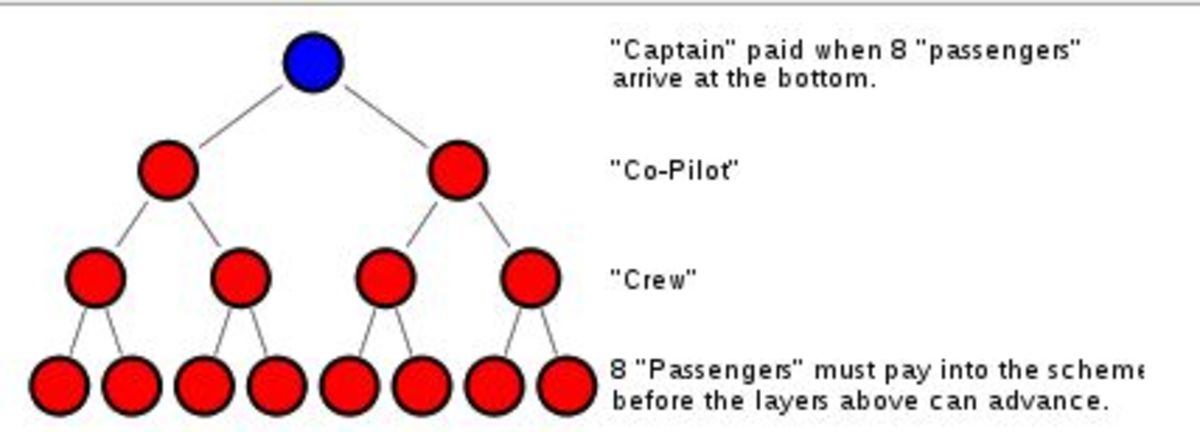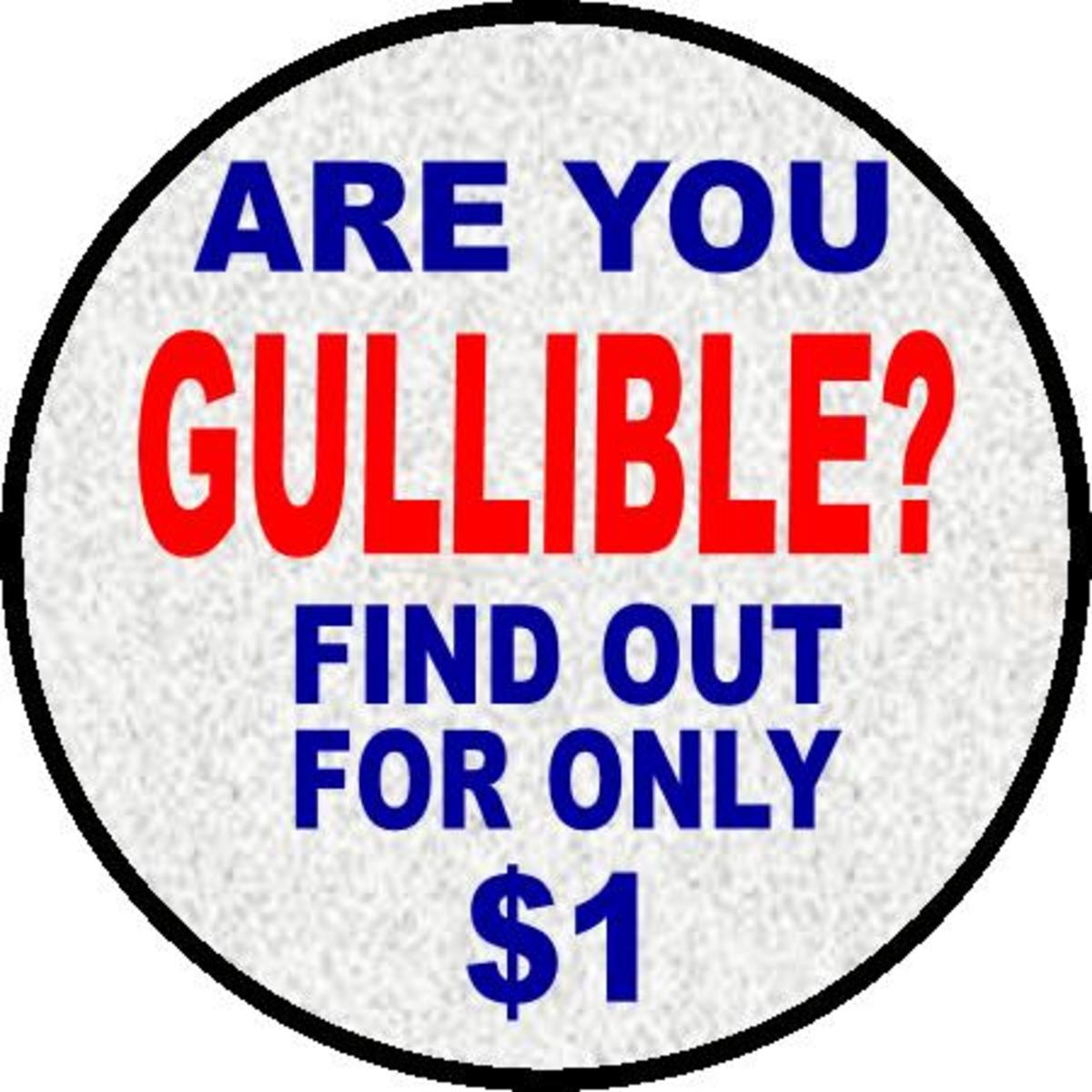Baloney Test by Michael Shermer test of legitimacy to any MLM Opportunity: "I want to believe" is not valid business!
Introduction
A dozen multi-level marketing companies are launched every day, and all of them claim to be "the next big thing". Unfortunately, too many of them are just... baloney. So how do you tell which ones are baloney, and which ones are not?
Why have a test at all? Because you should NEVER believe everything you hear. That's the entire point of being a skeptic, and that applies to everybody.
Michael Shermer, noted skeptic, has a list of 10 questions you should ask to test any claim (pseudo-science or not). He called it "Baloney Detection Kit", and works great against pseudoscience.
Previously I noted that pseudo-MLM scams and pseudo-science have much in common. What if we apply the Baloney Detection Kit to multi-level marketing company's claim that they are profitable and have a future and all that? Will we be able to detect that they are a scam or not? Let us find out.
Michael Shermer wrote: "Pseudoscientists often appear quite reliable, but when examined closely, the facts and figures they cite are distorted, taken out of context or occasionally even fabricated. Of course, everyone makes some mistakes. And as historian of science Daniel Kevles showed so effectively in his book The Baltimore Affair, it can be hard to detect a fraudulent signal within the background noise of sloppiness that is a normal part of the scientific process. The question is, Do the data and interpretations show signs of intentional distortion? When an independent committee established to investigate potential fraud scrutinized a set of research notes in Nobel laureate David Baltimore's laboratory, it revealed a surprising number of mistakes. Baltimore was exonerated because his lab's mistakes were random and nondirectional."
Test 1: How Reliable is the Source?
Who made the claim? Is that person or organization real, reliable, have a history, and can be verified to have actually made such claims? Does this person or organization have a reputation of publishing good research?
Most MLM claims are from a claimant, probably a member, who has no reputation other than "many years of MLM experience", and may have pushed many other MLM before. Thus, none of the information can be trusted without having been verified first. In fact, any "pseudo- MLM scam" supporters often use distorted logic and outright fake definitions to "justify" their claim that "XYZ MLM is legitimate, easy, and makes money quick".
Remember Reagan's motto: "Trust, but verify." If the speaker has no reputation of speaking the truth, then the opinions in the claim can be trusted unless backed up by facts. You cannot support an opinion with another opinion.
Things to look for:
- How does the claimant came by his/her MLM experience, if any?
- Does the claimant have a reputation of speaking the truth, even if it is negative?
- Does the claimant have any actual stories of success in one or more MLM?
- Did the claimant explain both the good and the bad experiences?
Michael Shermer wrote: "Pseudoscientists have a habit of going well beyond the facts. Flood geologists (creationists who believe that Noah's flood can account for many of the earth's geologic formations) consistently make outrageous claims that bear no relation to geological science. Of course, some great thinkers do frequently go beyond the data in their creative speculations. Thomas Gold of Cornell University is notorious for his radical ideas, but he has been right often enough that other scientists listen to what he has to say. Gold proposes, for example, that oil is not a fossil fuel at all but the by-product of a deep, hot biosphere (microorganisms living at unexpected depths within the crust). Hardly any earth scientists with whom I have spoken think Gold is right, yet they do not consider him a crank. Watch out for a pattern of fringe thinking that consistently ignores or distorts data."
Test 2: Has the claimant made similar claims before?
Being not commonly accepted is not necessarily bad, but being consistently wrong is bad, both for morale and for reputation. On the other hand, pseudo-scientists don't mind being wrong, because their stuff is not really for public consumption, but rather, for people with similar beliefs.
MLM claimants often claim every MLM they came across as "next big thing". So what happened to the previous one? Does that mean they were wrong consistently? How do they explain that record of misses? (This also ties in to the "reputation" in the previous Test)
Things to look for:
- Does the claimant have a reputation of pushing many different MLMs?
- Does the claimant say the same thing ("next big thing!") for each / many / all of them?
- Does the claimant explain why he abandoned the previous MLM, if this is a new MLM? Or is he somehow running both?
Michael Shermer wrote: "Typically pseudoscientists make statements that are unverified or verified only by a source within their own belief circle. We must ask, Who is checking the claims, and even who is checking the checkers? The biggest problem with the cold fusion debacle, for instance, was not that Stanley Pons and Martin Fleischman were wrong. It was that they announced their spectacular discovery at a press conference before other laboratories verified it. Worse, when cold fusion was not replicated, they continued to cling to their claim. Outside verification is crucial to good science."
Test 3: Is there ANY neutral third-party verification of the claim?
MLM claimants issue claims that are usually only confirmed by their "upline" or "downlines", i.e. people in the same organization. They often regurgitate the company line, without any attempt to verify them. Why should they not be verified?
If the MLM opportunity is such a good money maker, it should be covered by magazines and newspapers and such, and not just in "press release" style short articles, but a thorough review and analysis with all the pros and cons highlighted. Where is the coverage?
If all the coverage you find is through Internet or word of mouth, it is either the most stealthy launch ever, or it is something deemed unworthy of mention by traditional media. And if all the news you find on traditional media are bad, like "XYZ MLM under investigation for fraud", then it is clearly something to avoid.
Beware of so-called MLM Review websites or MLM "coach" websites. The true affiliation of such websites are unclear. Some are just barely disguised recruitment sites. Others cite useless statistics like "search popularity ranking". You need to check reputation of each of these supposedly 'reviews' carefully. In this case, negative reviews is probably more important than positive reviews.
Government is the ultimate arbiter. If one or more governments (even those on the other side of the world) say a company is a scam, it probably is a scam, despite anybody else's claims and assurances.
Things to look for:
- What does a real professional say? In MLM, that would be either MLM critics, or MLM lawyers.
- Any magazine or newspaper coverage of the company (on the company itself, not events held by the company)? (see note)
- Any consumer reporter(s) covering the company?
- Did any government (all around the world) acted against the company?
NOTE: Some scams hold "launch events" with singers, dangers, seminars, and so on. Some newspapers and such cover THAT, but not the company itself. Such coverage is no better than "press release" information, and thus is useless for evaluation of the company.
Michael Shermer wrote: "An extraordinary claim must be placed into a larger context to see how it fits. When people claim that the Egyptian pyramids and the Sphinx were built more than 10,000 years ago by an unknown, advanced race, they are not presenting any context for that earlier civilization. Where are the rest of the artifacts of those people? Where are their works of art, their weapons, their clothing, their tools, their trash? Archaeology simply does not operate this way."
Test 4: Does the claim fit within what we know about how things work?
The world is huge and any sort of knowledge must fit within the world, and even a single development or claim can have widespread effects around the world. Does the claim change the world, and if so, does the change actually make any sense?
One of the most often claims by multi-level marketing is it is a great way to market anything and it will change the world. Unfortunately, it is far from the truth. Amway has been around for like 5 decades now. If MLM is so superior to conventional marketing methods, it would have taken over the world now. Instead, MLM is still a TINY fraction of overall goods sold, relegated to the fringe markets and often unproven products.
A certain travel scam claims to be a travel club where you can help sell travel and make up to $10000 a month. However, it makes no sense. How much travel do you have to sell to make $10000 a month? Let's assume a VERY generous commission of 10%, you need to sell $100,000 worth of travel to make $10000 a month. Can a single person sell $100000 worth of travel in a month a few weeks after joining? Clearly this is impossible. The world doesn't work like that. (Indeed, the compensation plan revealed that this scam pays when you 'cycle out' of 2 different 2x3 matrices, which amounts to... 225 recruits, each of them paying $250 into the system. That is indeed possible in a month, but that would make it a pyramid scheme. )
Very often, MLMer will use the "it's so new you just don't understand it!" argument. This is about as bogus as excuses go. If they can't explain it, then why is it YOUR problem?
Things to look for:
- Does the claim of revolutionary product or service make any sense?
- Does the claim of "easy money" make any sense?
- Does the claim of legitimacy make any sense?
Michael Shermer wrote: This is the confirmation bias, or the tendency to seek confirmatory evidence and to reject or ignore disconfirmatory evidence. The confirmation bias is powerful, pervasive and almost impossible for any of us to avoid. It is why the methods of science that emphasize checking and rechecking, verification and replication, and especially attempts to falsify a claim, are so critical.
Test 5: did the source set out to prove or disprove the claim?
Confirmation bias, a cognitive bias where the brain seeks only data that confirms the claim, is a problem that have biological causes. It is common to all humans, and can be both conscious, and unconscious. It is also extremely unscientific. Pseudo-science often have the claim first, then went to look for data confirming it. Science should be the exact opposite: gather a lot of data in experiments, then create a theory or hypothesis to explain as much of the data as possible.
When it comes to information about a particular opportunity, you have to study the information. What is the "bias" of the claimant? Most supposed "reviews" of an MLM opportunity are actually recruiting speech, so obviously the "reviewer" wants to PROVE that MLM opportunity is good. Thus, s/he may be subject to confirmation bias, either consciously or unconsciously.
A MLM claim often starts high (it's a great opportunity) and ends even higher (join now!). Few if any MLM claimants started examination of the opportunity with a neutral view, or even a cynical view. Few of them present ANY negative data at all. That's why when you see a positive review, it's often useless. You need to look for the NEGATIVE reviews, and see if the issues raised actually makes sense (and why were these never addressed in the positive reviews).
Things to look for:
- How did the claimant initially viewed the claim? Is there healthy amount of skepticism? Or is it cheerleading all the way?
- Did the claimant actually sought to disprove the claim at all? Or was the claim accepted as is and data found to support it? Was the negative information simply ignored?
Michael Shermer wrote: The theory of evolution, for example, is "proved'' through a convergence of evidence from a number of independent lines of inquiry. No one fossil, no one piece of biological or paleontological evidence has "evolution'' written on it; instead tens of thousands of evidentiary bits add up to a story of the evolution of life. Creationists conveniently ignore this confluence, focusing instead on trivial anomalies or currently unexplained phenomena in the history of life.
Test 6: What does MAJORITY of the evidence say about the claim?
One of the most frequent tools by holocaust deniers is to ignore the preponderance of evidence. Instead, they sought to create doubt in some of the evidence which somehow "suggests" that the rest of the evidence may be doubted.
Same thing happens in world of multi-level marketing. When critics point out problems with the company, the issues are ignored, minimized, ridiculed, and so on, MLM claimants often ignore the overall evidence (for example, multiple countries have charged the company as pyramid scheme fraud), but instead, try to discredit some of the critic's claims, using every sort of fallacy possible, including personal attacks.
Things to look for:
- Did the claimant look at most / all the evidence, or just stuff that supported his/her claims?
- How the the claimant explain his/her selection of evidence?
- Did the claimant even acknowledge the existence of other / contradictory evidence?
Michael Shermer wrote: A clear distinction can be made between SETI (Search for Extraterrestrial Intelligence) scientists and UFOlogists. SETI scientists begin with the null hypothesis that ETIs do not exist and that they must provide concrete evidence before making the extraordinary claim that we are not alone in the universe. UFOlogists begin with the positive hypothesis that ETIs exist and have visited us, then employ questionable research techniques to support that belief, such as hypnotic regression (revelations of abduction experiences), anecdotal reasoning (countless stories of UFO sightings), conspiratorial thinking (governmental cover-ups of alien encounters), low-quality visual evidence (blurry photographs and grainy videos), and anomalistic thinking (atmospheric anomalies and visual misperceptions by eyewitnesses).
Test 7: Did the claimant use commonly accepted logic, rules, and definitions for the claim?
A claim must be backed up by existing solid science or logic to be accepted as proper. If the claim is based on fake science, bad science, or a logical fallacy, then it is not a valid claim at all.
Some MLM proponents will explain that their MLM is not a pyramid by citing the definition of a pyramid and explain why MLM is not like the definition. However, if the definition of the pyramid that was cited is wrong, then the explanation is wrong, and the claim will be invalid.
Some MLM proponents are known to misquote official sources, or even outright manufacture alleged official sources. For example, Saudi news reported that a scam's proponent went as far as faked a fatwa (religious ruling under Shariah law) claiming the scam is perfectly legal. The official was surprised and angry that his name was used to "justify" a scam.
In other cases, the logical fallacy is more circumspect. Many MLMer will claim that their opportunity is not a scam because they got money from it. Unfortunately, they are ignoring how a pyramid scheme works: the early joiners get paid, the late joiners get stiffed. Thus, getting paid does NOT disprove that the scheme is not a scam. Merely not THAT kind of scam (where it pays nobody).
Things to look for:
- If evidence is cited to support a claim, what is the source of the evidence? Can such evidence be verified?
- Is such evidence still current? Can such evidence be confirmed? (Experiments can be repeated, and so on)
- If definition is used, is the definition accurate? What is the source of the definition? (dictionary, source of authority, and so on)
- If logic is used, is the logic valid, or a logical fallacy?
Michael Shermer wrote: This is a classic debate strategy--criticize your opponent and never affirm what you believe to avoid criticism. It is next to impossible to get creationists to offer an explanation for life (other than ``God did it''). Intelligent Design (ID) creationists have done no better, picking away at weaknesses in scientific explanations for difficult problems and offering in their stead. ``ID did it.'' This stratagem is unacceptable in science.
Test 8: Is Claimant providing explanation for observation, or is denying existing explanation?
Creationism and Intelligent Design proponents are fond of not providing a proper scientific theory, but instead pick holes in the theory of evolution, solely to negate the other theory.
Some MLM proponents take the same approach. Instead of proving that their business is legitimate, they assume that their business is legitimate and instead tries to pick holes in the critic's positions.
One particular scam is known to never claim itself is legitimate, leaving it up to its members. In fact, it does not even acknowledge charges in multiple countries that it is an illegal pyramid scheme.
In other cases, members have resorted to logical fallacies, such as "it's not a scam because it paid me, so you're wrong" (NOTE 1) and "this aspect of the business is legal" (NOTE 2) or even personal attacks such as "you are obviously employed by our enemies".
Things to look for:
- Does the claimant start claim with "Is XYZ MLM a scam?" and proceeds to refute it?
- Does the claimant use strawman fallacy and ad hominem attacks in the refutation?
- Does the claimant actually have a position to prove, or is it to solely disprove the opposite claim?
NOTE 1: As explained before, a pyramid scheme will pay the early joiners and stiff the late comers. Thus, "it paid" proves nothing. What needs to be proven is "this is not a pyramid scheme".
NOTE 2: A lot of these "cyclers" or "pyramid scheme" mixes a legitimate business (auctions, business printing, travel, etc.) with an illegal pyramid scheme by making a single membership do both. The member point at the legitimate half of the business and claim the whole thing is legitimate, ignoring the illegal pyramid scheme side.
Michael Shermer wrote: Many HIV/AIDS skeptics argue that lifestyle causes AIDS. Yet their alternative theory does not explain nearly as much of the data as the HIV theory does. To make their argument, they must ignore the diverse evidence in support of HIV as the causal vector in AIDS while ignoring the significant correlation between the rise in AIDS among hemophiliacs shortly after HIV was inadvertently introduced into the blood supply.
Test 9: If Claimant is providing new explanation, does this explanation cover as much data as the old explanation?
If a new explanation covers LESS data than the older explanation, then this new explanation is useless. The ideal explanation can explain all the data. A new explanation that does NOT improve upon the old explanation by explaining MORE data is WORSE, and therefore worthless.
Some scams disguised as MLM often have multiple guises. For example, a certain company in Asia first presented itself as a "survey company" (i.e. take surveys, get money). However, when a TV station investigated it, its CEO claimed that it is a "panel provider company" (market out members to companies that need surveys done). Its lawyer, on the other hand, claims that the company is a e-zine publisher (all "panelists" are just subscribers of a very expensive online newsletter). Media just call it 'pyramid scheme', and so did the government, when India's "Economic Offenses Wing" of the police got involved. Which explanation fits the data better?
In another example, a certain scam (also out of India) was intentionally vague about what does it do and what does it sell. It NEVER had a product page on their website, and depending on which page you read, its emphasis could be a) selling trips b) selling hotel vouchers c) selling lifestyle d) make you a ton of money e) it's a buying club of travel f) it's MLM g) it's home business. And its members have wild explanations all over the place. When the Australian court ruled it a "pyramid scheme", none of these bogus explanations mattered.
Things to look for:
- What are the data available? (As much as available, instead of just those easily accessible)
- Besides the "official" explanation, what alternative explanations are available?
- Which explanation covers the most data available?
Michael Shermer wrote: All scientists hold social, political and ideological beliefs that could potentially slant their interpretations of the data, but how do those biases and beliefs affect their research in practice? Usually during the peer-review system, such biases and beliefs are rooted out, or the paper or book is rejected.
Test 10: Does the claimant's personal beliefs and biases influence the claim, or is it the other way around?
Ideally, the claimant should be neutral toward the claim. However, this is almost NEVER true when it comes to a MLM. Every MLM participant is always pro-MLM (sometimes anti-competition). Thus, any sort of MLM endorsement by MLM veteran or MLM member are suspect.
There is no "peer-review" or "neutral party review" in MLM world. Any sort of publication either online or off is written by individual members, often with ZERO review by even the MLM company itself, much less anybody else. This often leads to massive abuse by members who make false or exaggerated claims to score members. A certain wellness company was indicted by attorney general of Texas for allowing members making false claims about powers of their products.
Things to look for:
- is there any neutral review of the information provided?
- does company itself have rules on what can and cannot be said or claimed?
- does the company itself review any claims? Is there a review panel? (may also be ethics panel)

Conclusion
Fox Mulder of X-Files has that poster in his office.
"I want to believe"
But then, Fox Mulder is a fictional character with deep psychological issues, including having a sister kidnapped by aliens when very young.
Do you WANT to believe?
Why?
Are you joining a religious experience? Or an income opportunity?
What does income opportunity have to do with belief? Do you think the facts would look better if you believe in them?
If you want to believe in "easy money", then you are a magnet for scammers ready to fill you with baloney.
If you don't want to eat baloney, please use the baloney detection kit. It works on evaluating all information, esp. pseudo-MLM scams.
More on Anti-Scam
- How an Internet Ponzi or Pyramid Scheme Works, and H...
Learn how Internet Pyramid Scheme and Ponzi Scheme operate, and how you can spot them with simple list of 5 questions and a dose of skepticism. - How a Scam Works: distorting your gain, risk, and va...
Do you know the three factors used in cost/benefit equation? It's cost, benefit (also called gain or value), and risk. Learn how a real scam mess with your estimate of those three factors. - Why do people fall for believe Internet Scams, and o...
Why do people fall for scams and once in, stay in? I'll show you what cause people to be vulnerable, 3+1 stages of scam, how to spot scam and the crap info they spread, and 3 simple steps to avoid scams. - Confirmation Bias: What is it, How it affects You, W...
Confirmation bias: root of most evils? How your mind traps itself in a circle, and how to get out. - 9 signs Multi-Level Marketing MLM Opportunity is act...
Multi-level Marketing (MLM) is hardly new, but it is one of the least-regulated type of business, as it is one of the youngest. Basically, instead of just selling, there is a bit of recruiting as well, and...







